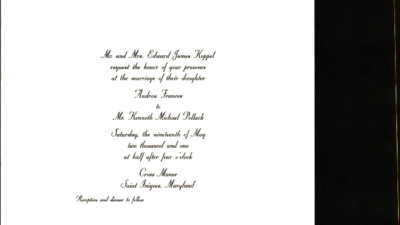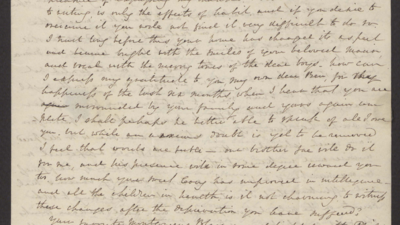Oral History Interview with Helene Goodman
Title
Date
Contributor
Summary
Helene Goodman, formerly Henia Flint, was born in Lodz, Poland in 1913 into an orthodox family. She studied piano at the Warsaw Conservatory posing as a non-Jew, and got her diploma in 1935. She briefly describes how the German invasion affected Polish Jews. In 1939 Helene and her family had to move to the Lodz Ghetto. Her father was brutally beaten by the KRIPO (Kriminalpolizei), lost his mind, and later died. She witnessed Polish-German cooperation, and the murder of Jewish orphans in the ghetto.
Helene and her mother were transported to Auschwitz in August 1944, when the ghetto was liquidated. She describes the dehumanizing arrival process. During a “selection” by Dr. Mengele, she was separated from her mother and never saw her again. She is the lone survivor of her family. Helene was forced to play the piano for the camp commander’s birthday party and was stabbed repeatedly when she was too stunned to perform. Her wounds were not treated. A Jewish KAPO put her on a transport to Hainichen (a subcamp of Flossenbürg), near Chemnitz, Germany to save her life.
Helene worked as a slave laborer at Framowerke, an ammunition factory. She describes living and working conditions. The supervisor was Gertrude Becker, an SS woman who was extremely cruel. She describes the effects of near starvation, how she tried to cope, and her acts of sabotage.
Helene describes a Deathmarch at the end of April 1945, guarded by SS officers who took off their uniforms and fled once they arrived at Theresienstadt. She was liberated by the Soviet army May 9, 1945. Soviet women doctors treated the survivors. American soldiers took her to a quarantine camp at Landsberg am Lech where she tried to recover from the physical and emotional after effects of her experiences. She describes her post-war life in Regensburg, Germany after she met and married her husband, Jacob Gottlieb, including a frightening act of antisemitism and Zionist activities.. They lived in Regensburg, Germany until they immigrated to the United States. She concludes with her personal reflections on the Holocaust.
More Sources Like This
of
K. R. Anonymous
K. R. was born in Tarnopol, Poland, March 31, 1922. Her father was a businessman and her family was greatly influenced by Viennese culture. She briefly describes the start of overt antisemitism in her schools. She was a member of HanoarHatzioni and active in Zionist youth groups in Tarnopol and L’vov.
In 1940, under Russian Occupation, she and a group of HanoarHatzioni members were caught by some Ukrainian villagers—as they tried to cross the border illegally—and delivered to police. K. R. was sent to prison and later transferred to a labor camp near the North Pole. She describes the harsh conditions in the camp and why some of her fellow prisoners did not survive. She was released because she was Polish but given Soviet citizenship and sent by train to another part of Russia. Many strangers helped her during this time. She worked as a bookkeeper at a collective farm (kolkhoz) near the Russian village Devochki Gorki on the Volga River. When the German Army advanced, she was deported to Kazakhstan by train. She describes the conditions under which she lived. She worked as a bookkeeper in Kustanay. After the NKVD tried to recruit her as a spy, she fled to Alma Ata using documents she forged.
In 1945, after the war, she returned to Tarnopol and found it almost completely destroyed. She joined a kibbutz in Lodz and worked with HashomerHatzair to prepare young Russian refugees for life in Palestine. She also organized and led illegal border crossings to get them there. During this time she met and married her husband. They went to Palestine, from Cyprus, on a ship called The State of Israel in 1948, escorting a group of young Jewish children who had been hidden in monasteries or by Polish families. K. R. then reflects about how her experiences have shaped her outlook on life and her views about human behavior.
of
Marian Filar
Born December 17, 1917 in Warsaw, Poland, Marian Filar was a member of a musical and religious Jewish family who became a child prodigy and a noted concert pianist and teacher. His father was a manufacturer and his grandfather was a rabbi. He studied at the Warsaw and Lemberg conservatories and graduated from Gymnasium in Warsaw. In September, 1939, he fled to Lemberg following the German invasion. After graduation from the Lemberg Conservatory in December, 1941, he rejoined his family in the Warsaw Ghetto. He worked with a labor group taken outside the ghetto to a railroad workplace in Warsaw West. He describes severe beatings by S.S. guards and his rescue by a Polish railway man. He details his solo performance and other symphony concerts in the ghetto by Jewish musicians, often playing music by forbidden composers. He mentions ghetto deportations, 1942-43, when his parents and siblings were taken.
In May, 1943, after the ghetto uprising, he was deported to Majdanek. After beatings and near-starvation, he volunteered for a labor camp in Skarzysko-Kamiena, where he received aid from a fellow worker who was Polish. Moved to Buchenwald in August 1944, he was housed in a tent camp with Leon Blum, Deladier and other prominent politicians and clerics. Mr. Filar was moved next, by train, to Schlieben, near Leipzig, to work in a bazooka factory, where a Polish kitchen maid gave him extra food. His piano playing impressed the German civilian camp supervisor who transferred him to an easy job to protect his hands. As the war front moved near, he was sent with other prisoners by train to Bautzen and then on a death march to Nicksdorf (Mikulasovice) in Czechoslovakia. He and two brothers survived and lived in Zeilsheim Displaced Person’s camp in Germany for two and a half years.
After liberation, he performed in concerts through Western Europe and toured Israel, playing with the Israeli Philharmonic during the war in 1956. He shares a moving vignette about going to Professor Walter Gieseking’s villa and auditioning to become his student. He studied with him for five years.He emigrated to the USA in 1950, where he played with many American orchestras, headed the piano department at Settlement Music School in Philadelphia, and joined the faculty at Temple University. After retirement, he taught privately and judged international piano competitions.

This document is a formal wedding invitation from Mr. and Mrs. Edward James Koppel. They are inviting guests to the marriage of their daughter, Andrea Frances Koppel, to Mr. Kenneth Michael Pollack. The ceremony is scheduled for Saturday, May 19, 2001, at half past four in the afternoon (4:30 PM). The wedding will take place at Cross Manor in Saint Inigoes, Maryland. The invitation also notes that a reception and dinner will follow the ceremony.
of
Edith Millman
Edith Millman, nee Greifinger, was born in 1924 in Bielsko (Bielitz), Poland. Father was an executive for Standard Oil Co. In 1937 the family moved to Warsaw. She was injured during the bombardment of the city in September 1939 when bombs hit the building in which they lived. She describes persecution of Jews which started immediately after the occupation and the horrendous conditions in the Warsaw Ghetto into which they were forced to move in November 1940. While there, she was able to study in small clandestine groups organized by teachers. She briefly discusses the Judenrat.
She worked at the Schultz factory until the end of 1942 when she escaped from the ghetto. With forged papers received from Gentiles, she passed as an Aryan and worked as a translator for the German railroad. She stole railroad identification cards, food stamps and coal with which she helped others. She describes fear of being discovered and close escapes. Speaking German and pretending to be an ethnic German helped her to throw off blackmailers. She lost many relatives, describes the deaths of several. After liberation by the Russians in August 1944 she studied medicine in Lublin, Poland, and after the war’s end in Marburg/Lahn, Germany, she came to the University of Kentucky in Lexington, KY in December 1947 on a B’nai B’rith Hillel scholarship. Her parents arrived in the USA in 1949.
of
Betti Frank
Betti Frank, née Koppel, was born in Zutphen, Holland. Her parents had a butcher shop. She briefly describes pre-war life. Betti and her brother belonged to Hehalutz, a Zionist youth group. Betti describes life after the German invasion, including registration of Jews, roundups, Razzias, raids, and collaboration by some Dutch people. The Dutch police arrested her father, sent him to a Dutch concentration camp and then to Mauthausen where he was killed. Betti describes how later the Dutch police came back for the rest of the family: Betti and her mother were taken to a building owned by the Jewish community which had been converted into a hospital for older Jews. She describes the round up of elderly and sick Jews in the community. Her brother was deported to Westerbork. She found out after the war that he was killed in Auschwitz.
In April 19431, Betti and her mother were deported to Vught concentration camp with all Dutch Jews who did not live in Amsterdam. She describes in great detail their arrival, the horrible conditions in Vught and a separate children’s camp where her mother worked as a nurse, Appells, extreme cruelty and constant terror. She also describes contact with non-Jewish prisoners and an offer to her by Hehalutz members to escape with false papers which she turned down to stay with her mother. Her mother was eventually deported along with the children and she never saw her again. Betti was then assigned to a slave labor group working for the Philips company together with non-Jews making radios and welding. She talks about how the SS tried to deport this group to Auschwitz several times and how they were saved by working for Philips. Finally in June they were sent to Auschwitz arriving June 6, 1944. She describes in great detail their brutal reception, processing, conditions and cruel treatment from Jewish Kapos. After 10 days, Betti, with the group selected by Philips, was transported out of Auschwitz to a factory in Reichenbach to work with German civilians. From there, the workers were sent to Lanowice concentration camp, and later forced on a death march to Trausenau, Czechoslovakia in February 1945, then forced on rail cars to a small camp near Port of Westfalen close to the Dutch border. Betti describes in detail their deportation to and working conditions in several camps: a salt mine in Braunschweig, Magdeburg; Lüneburger Heide, where they had to dig trenches at the front; and finally a small camp in Hamburg. She describes brutal living and working conditions, cruel behavior by German civilians, and some acts of compassion in great detail. She talks about some of her survival strategies and how she saved her life by following her instinct.
After the end of World War II, the prisoners were transported to Denmark under the auspices of Folke Bernadotte. They were sent to either Malmo or a “holiday” camp near Göteburg in Sweden, depending on their physical condition. Betty again worked for Philips. After a stay in Holland, she emigrated to Israel on March 12, 1950.
